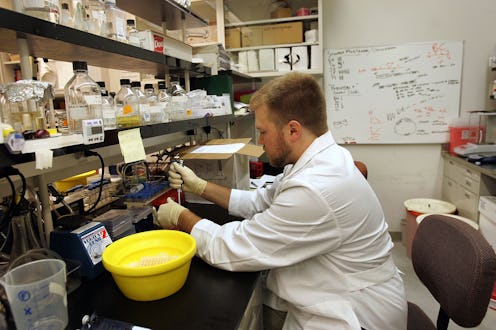News
The FDA Is Wrong To Ban Genetic Testing
The genetic testing company 23andme was ordered to immediately halt its service Monday by the Food and Drug Administration. The company, led by CEO Anne Wojcicke (wife of Google co-founder Sergey Brin), provides $99 kits that sample a client's saliva, which is then used to genetically test a client for a whole host of vulnerabilities and predispositions. The personal genome service "tells users whether they carry a disease, are at risk of a disease and would respond to a drug." The FDA contends those uses make it a medical device that requires special clearance from the agency.
“[The] FDA is concerned about the public health consequences of inaccurate results from the PGS device,” the agency said. “The main purpose of compliance with FDA’s regulatory requirements is to ensure that the tests work.” (The company responded by acknowledging that it has not met the FDA's expectations, and promising to work with them to return the product to market.)
According to the website, the genetic testing provided by the company offers three keys:
1. Plan for your future. Find out if your children are at risk for inherited conditions, so you can plan for the health of your family.
2. Stay one step ahead. Understand your genetic health risks. Change what you can, manage what you can't.
3. Talk to your doctor. Arm your doctor with information on how you might respond to certain medications.
Harmless stuff, right? The FDA doesn't think so.
Among the "particularly concerning" tests offered by 23andme the FDA names tests for drug responses and "BRCA-related genetic risk." The latter is a gene commonly linked to an aggressive strain of breast and ovarian cancer (like the gene that led Angelina Jolie to a much-publicized double mastectomy earlier this year).
The 97-year-old matriarch of my family, my great-grandmother, is the keeper of our family's health history. Now that she is in declining health herself, my great-grandmother is using her days to spill a family secret here and there, and remember the deaths of her relatives. On days she's feeling particularly sentimental, she'll launch into stories of how our family lost its women young because of "womanly" cancers (and throw in the tale of one distantly-related alcoholic to warn me about the perils of drinking, for good measure). Though babushka proudly boasts that she hasn't seen a gynecologist since she gave birth in 1936, my own mother has suffered "womanly" issues of her own.
And that, in essence, is the point of 23andme: so that people like me, with a family history and a (high-risk) Ashkenazi Jewish background, can get some sense of what genetic straws we drew.
That's what the FDA fears. The fear isn't solely a false positive test — though officials should certainly look into how often those occur, particularly for the more serious tests. The real fear here is that knowing what's in the genetic cards might somehow persuade citizens to make decisions the FDA doesn't think are wise. The Washington Post's Timothy Lee explains:
But the FDA seems to be making a stronger, and much more dubious, claim: that even an accurate genetic test is dangerous because its results could be misinterpreted by patients. The FDA's own example shows how weak this argument is. Obviously, it would be terrible if a woman got a false positive for a breast cancer gene and got an unnecessary mastectomy or chemotherapy as a result. But mastectomies and chemotherapy are not available over the counter. To get them, patients have to seek treatment from licensed physicians. If 23andMe's BRCA test is unreliable, doctors will be aware of this fact, order a more reliable test and help the patient to properly interpret it. The point is a general one: Having more information about your health status is never dangerous by itself. It only becomes dangerous if patients use it to make dangerous medical decisions. But most dangerous medical decisions can't be made unilaterally; they generally require the assistance of licensed medical professionals who will do their own assessment of the situation before performing procedures that could harm patients.
A preventative mastectomy isn't the worst thing that could happen to a woman who finds out she's at high risk for an especially aggressive strain of breast cancer. Deciding what information I can or cannot handle shouldn't be up to the FDA. Leave it to me and my doctor.
If you're still curious about your genetics while 23andme deals with the FDA, there are some other companies offering similar services. But 23andme, by far the cheapest and most popular, is still selling kits on its site. Grab one while you can.
